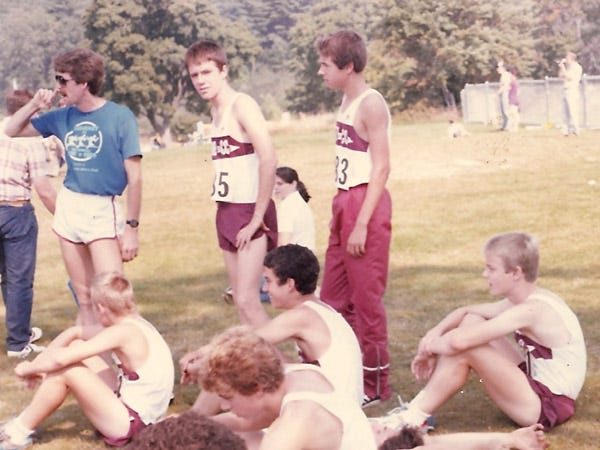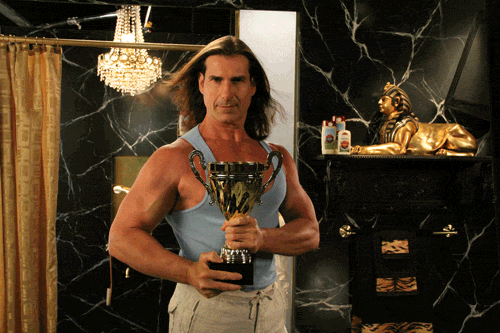Infiltrating the Runner's World "Join the Movement" issue (II)
People who do road races used to be honest weirdos
(This post continues the series I started here.)
The first road race I ever ran was a very flat 5-miler in early April of 1985 in Concord, N.H. called the Turtle Trot, then in maybe its sixth year and hosted by the now-long-dead Turtle Town Athletic Club[1]. I was 15 and coming off my second eye surgery in March, my first cross-country season the previous autumn, and a game winter of steady, solo 30-mile weeks, maybe sometimes more, in between. This seemed to be a lot of running, though I was aware that it was not and that I would eventually be required to extend my concept of “high mileage” considerably if I wanted to continue jogging in some kind of official uniform for more than a few seasons. For this race, I wore a green, short-sleeved Boston Celtics T-shirt and dark blue shorts with a fraying waistband and a hip pocket with a wad of Bubblicious occasionally fused to the inside; this was my usual training get-up when it was at least 50 degrees. I remember having a remarkable cold tolerance, like everyone that age. (In May, differently dressed but not much, I would enjoy my first official kiss, while the song “Voices Carry” played on MTV.)
I placed 28th out of 71 finishers, seemingly a large number of exercising adults in one place, with a time of 32:28. I remember going out in 6:03 and running the rest of the miles in 6:33 to 6:40, with the first one feeling no faster than the others and not really falling behind the people I started with. I traded places with a woman my mom’s age for most of the last mile, and eventually outkicked her, feeling bad about this despite it being her precise recommendation somewhere back on Pembroke Road. The women’s winner was about a minute ahead, and, I’m pretty sure, married to the guy who timed the race, which was not so much suspicious as cozy. (I had no idea how incestuous runners were then and still refuse to believe it.)
I placed second in my age group to a kid who would eventually become a rival and one of the best runners in the state when he gave a shit, which by the time we graduated was less than 50 percent of the time. I think the only other sports-related ribbon or piece of gimcrack I had ever won was for a frisbee-throwing contest in sixth grade. Two runners broke 25:00, with one of them, Larry Sayers, running 24:25. Larry was a year or two out of Keene State College at the time and would later become a CMS teammate and fellow N.H. Division II high-school track coach; at meets, the two of us would sometimes sneak off for an easy four if our respective buses got to the venue early enough. I’m almost positive there no prize money — this was just a rust-buster for the local yokels. They entry fee was $5 for juniors and $10 for everyone else, which included a drab but serviceable T-shirt.
I held on to the printed results for many years, and in the first days of holding them unwittingly committed at least some portion of almost every name to memory. I really should have stuck with computer programming from the start instead of veering off toward people-oriented careers, as I was not designed for those, but I prefer to see the upside: Had I done so, I’d be as miserable as I am today, just in a different way.
Coach Rusty shows how wearing shorts was done in the 80s.
It was typical in those days to run under 7:00 pace for 5 miles and be in the slower half of the field. This was not simply because everyone who ran races was a running natural, but because even the less gifted or those hampered by the inevitabilities of age almost always ran their asses off. This isn’t a value judgment, but a fact. It would have been jolting to see large numbers of people dawdling along enjoying the experience in a non-hardcore way. This only makes sense; there are so many more runners now as a function of the U.S. population that the demographics have undergone what statisticians call a shift toward the mean, which just means that your typical runner is now more like your typical citizen than before. Most of us older-timers view this as a mixed blessing.
People entering races and running them at an everyday effort, or walking part or even most of the way, started in the mid-1990s, and can to a large extent be credited to and blamed on Jeff Galloway. This will always strike some people — not all of them old-timers — as bizarre. Why spend the money on a race bib, just to bop along elbow-to-elbow with a bunch of giggling selfie-takers and Vladimir Putin impersonators? (I haven’t seen that last spectacle yet, and in a vague way I hope not to.) It’s hard to understand for many people why anyone places so much value on receiving a medal for just finishing a marathon or any standard running event. I mean, what the hell have we all been trained to seek in our lives?
But when people complain about how many casual runners there are in race fields, most, I assume, don’t care how hard anyone tries. They’re upset at the structural changes this has wrought, understandably so, including exorbitant road-race fees that have spiked well out of proportion to inflation since I started (a subject the louder pro-inclusion, pro-diversity people might want to address when not bitching about phantom slights; it used to be easier for poor people to enter road races, kids).
An inevitable consequence of a greater number of everyday folks taking part in a sport that coldly sorts people by ability is that people participating in road races have continued to demand more and more attention for progressively less impressive athletic feats, bend the rules to appear better than they are, or both. By “bend the rules” I don’t just mean cheating to gain entry into races like the Boston Marathon, or fudging GPS data on downhill courses to achieve loftier “PRs”; I mean trying to secure serious sponsorship or even professional running status despite being in the Homer Simpson category of athlete, right down to the unconscious, cavorting self-debasement.
What appears to have happened is that a significant number of people who can’t run fast enough to make an impact in a sport (or activity) called “road racing” have decided to make an end run around the sad fact of their times and create niches as “strong runners” (so named because of the time spent in the weight room I guess) and such, which they then frame to be lateral to runners who are demonstrably proficient at running. It’s really been fascinating to see a battle for Internet supremacy among professional runners — most of whom just want to train and race with their teammates rather than play the constant engage-with-everything game some commentators insist on — and the worldwide army of ass-waggler and gym-bro runners who vastly outnumber these elites and, on top of that, have less per capita shame than almost anyone alive.
More recently, expectations have wandered past even the realm of “Slow, but with a great story and relevant to the sport as a whole” to “Preferably slow, but definitely in a real or imagined oppressed group.” People are proudly treating others differently on the basis of skin color, all while lying gaily about everything of substance and hectoring people to jump on the “inclusion” bus. I may not seem like I have much self-preservation left in me, but even as I type out posts, that bus keeps careening further toward the edge of the precipice and the 2,000-foot chasm beyond, and I prefer to watch its ass end flip over from here without anyone on board ever even imagining the vehicle to be equipped with brakes. Sorry, but all posts here inevitably digress into how obnoxious some people in the running media proudly are, and Outside’s are the current leaders.)
Another major change to the environment as a whole is that almost no one I know reads running magazines, including the one I’m sort of discussing here, and, favoring Letsrun.com and a host of other platforms for their immediacy and data-stashes, fewer people seem to be looking at the online-only outlets or the companion sites of print entities like Runner’s World. Not one of my friends, and despite appearances I do have them, reported seeing the tempo-run piece in the November/December issue or even knew where to reliably track down a copy. (Ordinarily, and especially since I wasn’t compensated for anything I did for this reboot, the publisher would send a free contributor copy, but that wasn’t the case here. When I asked about this, I was told that the RW offices were literally being moved and that everything was in boxes, so that request would have to wait. I took the hint and went shopping.)
Almost all of these changes have necessarily degraded distance running as a sporting enterprise, and the quality and credibility of the material in the magazines devoted to runners and running has correspondingly slid into the mire. The addition of more bodies is not something to complain about; yes, everything is more difficult with more people at a race, from parking to bathrooms, but newcomers have as much right to be there as some grizzled hippie in a terrycloth bandana who ruins the cred of his vintage get-up by taking 15 minutes to force a dump from himself while a line of irritated would-be shitters, men to a one leaking the fumes of nervous pre-race ass, forms outside the stall. And there are always, always great small races to run, some of them managed by people who are new to the environment but understand what a lot of people want: That admittedly hard-to-satisfy combination of loneliness on the road and intimacy with a bunch of underdressed smelly people who, in that quiet moment right before the gun is fired, share a perfectly tuned aura of shared expectation, a feeling no amount of money can ever buy.[2]
The more recent instances of contrived controversies and finger-waggling social-media excesses are only going to get worse, but in keeping the focus here on the available road-racing experience — whenever it resumes in earnest — I don’t see how much difference that will make for everyday people, unless the dissent with the patriarchy becomes sufficiently extreme for the SJWs to start lining themselves across the road at the start of road races so that they can’t start…wait. That only works when it’s not a running event. Well, count on them to ruin the decency or integrity of various somethings, somehow; the reverse Midas touch of intersectional feminism is no more an accident than the far-flung deleterious effects of fundamentalist religious ideas are.
But as much as I seem to thrive on pointing out and heckling the liars and weasels who have dotted the distance landscape lately, it’s important to emphasize that I don’t expect anything to change — I’m a stoic at heart, or aiming for that — and in fact am often just eager to cheer on the sport’s unraveling as the folks behind the unraveling are to ruin nice things in the name of publicly owning someone or something. This is because these types wind up publicly owning themselves, and dragging down anyone who visibly supports them. It’s hard to not pull for this to happen in every situation, as the authors of various Greek tragedies figured out millennia ago, because there is a crude emotional payoff in watching righteous losers take it on the chin. Were there no appeal in this, we would all be watching television and movies made exclusively for the six-and-younger set. But when it comes down to it, I prefer to root for destruction only when the war pits imaginary villains against imaginary victims, and in the case of running-blabbermouths, it would be nice to see some semblance of integrity return.
It’s one thing to do something truly difficult and brag about it. But road races, especially marathons, have become a popular way for people to convince other people they’ve done something remarkable when they haven’t. Anyone who has both finished a marathon and experienced sustained, unwelcome physical stress (e.g., the flu) understands how much harder the one is than the other, but are often not eager to advertise this so that they can better validate their self-promotion. If the secret ever gets out that human legs — evolved in part to create a larger surface for tattooing, but also for the purpose of locomotion — are doing nothing extraordinary in allowing someone of even marginal fitness to perambulate for an entire morning, all of those tin-whistle medals will lose their veneer of fitness authority, and people who claim to be running for the exercise and sanity might even decide they don’t have to do it with an Insta-ready bib on.
[1] “Turtle Town” is an archaic name for a part of East Concord a few miles southeast of my childhood manse. Turtle Pond is probably Concord’s second-largest natural body of standing water. In between the childhood manse and this pond is Oak Hill, the highest point in Concord, soaring a grand 920’ above the Atlantic Ocean 40 miles distant. Had I been in charge 300 years ago, Concord’s prominent features would bear far more creative names today, although nearby Snap Town somewhat redeems the drunken old-timers.
[2] Credit for the concept to this guy, just before the 1989 New England Intercollegiate Cross-Country Championships at Franklin Park in Boston, Mass.




